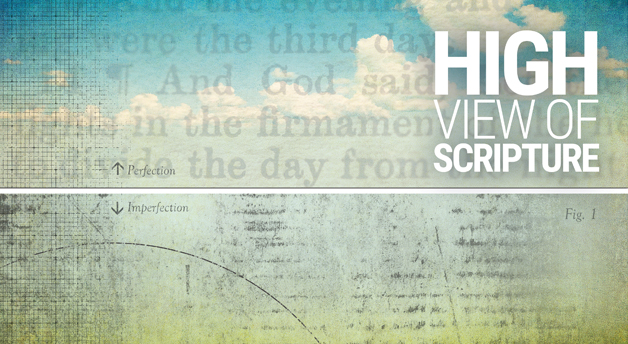High View of Scripture
At Mid-America, our worldview—and our degree programs—begin with the conviction that the Bible is true, authoritative, and sufficient.
“Jesus was a product of His times,” a college professor said.
I will never forget my freshman year in college when we were taught that Jesus was a product of His times. He did not understand modern medicine. When Jesus said that a man was demon-possessed, He did not understand mental illness. Though I had only been a believer for a few years, I knew this concept was wrong. I did not have a good explanation, however, for my view. In one sense, this problem drove me to seek how to answer people with such a low view of the Bible.
This subject uses a variety of words and phrases uncommon in everyday conversation. Words like inerrancy, infallibility, verbal plenary inspiration, the inspiration of the autographs, and sufficiency often appear.
My favorite explanation of the inspiration of the Bible came from Dr. Roy Beaman, a longtime Southern Baptist scholar. Dr. Beaman taught for years at both New Orleans Baptist Theological Seminary and Mid-America Baptist Theological Seminary. He was a Jesus-loving, soul-winning Bible scholar and preacher. Dr. Beaman said that drawing an imaginary horizontal line can explain all views of inspiration. Above the line is God’s realm and a place of perfection. Below the line is the realm of mankind, which is a place of imperfection. Either you believe that God lowered Himself below the line and gave us an imperfect Bible. Or you believe that God elevated the authors of Scripture above the line into the realm of perfection and gave us a perfect Bible.
My view is that the Bible is an inerrant book; it has no errors. The very words of Scripture, not just the ideas, are revealed from God as His perfect truth. The human authors still expressed their personalities, but the end result was precisely what God the Holy Spirit intended.
So why would anyone deny that the Bible is true? The answer may be older than you think. In one sense, the temptation of Adam and Eve in Genesis chapter 3 shows the tactic of Satan. The Devil stated, “Has God really said…?” Casting doubt on the Bible has long been a primary means to undermine the evangelism of the lost and the faith of the believer. In the Old Testament, one of the severest forms of punishment was reserved for false prophets. Those who claimed to speak for God but changed His message were condemned.
In the modern era, an approach to the Bible, sometimes called German Higher Criticism, sought to turn the Bible into just another book of ancient myths. Eventually, this radical philosophy worked its way into our beloved Southern Baptist Convention. Crawford H. Toy was forced to resign as a professor from the Southern Baptist Theological Seminary in 1879. Toy had embraced this higher critical view of Scripture. Crawford Toy left Kentucky to teach at Harvard and died a Unitarian.
In 1925, the Southern Baptist Convention met in Memphis, Tennessee. Near the top of the agenda was to adopt a confession of faith directed at combating Darwinian views of evolution. On a side note, they also adopted the Cooperative Program. The theory of evolution was (and is) a direct attack on the authority of Scripture. This is especially true as it relates to the creation account of the Book of Genesis. In the 1950s, a professor at the newly-founded Midwestern Baptist Theological Seminary published a book entitled The Message of Genesis, which attacked the orthodox view of the first book of the Bible. Ralph Elliot, the book’s author, later left Southern Baptist life to pastor a church in Albany, New York, a part of the liberal American Baptist denomination.
By the 1970s, enough pastors were concerned with the theological drift in the Southern Baptist Convention to begin what became called “the Conservative Resurgence.” Going back to a high view of Scripture, this movement rescued the denomination from theological liberalism.
Today, many people claim to believe in the total truthfulness of the Bible. They deny, however, the ability of the Word of God to be all that the believer needs for personal faith and practical living for the Lord. This most recent challenge to the Bible would hold that the Bible is not sufficient. We need something else for the guidance of our lives. Suffice it to say the Bible is both true and sufficient for the born-again believer in Jesus Christ.
More resources
- Baptists and the Bible: Revised and Expanded by L. Russ Bush and Tom J. Nettles (Broadman & Holman Publishers, 1999)
- Sufficiency of Scripture series
- “Championing Biblical Preaching” blog post by Dr. David L. Allen
- “What Is Biblical Counseling?” blog post by Dr. John Babler
